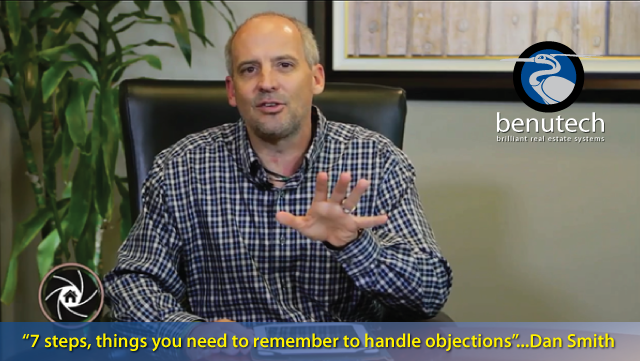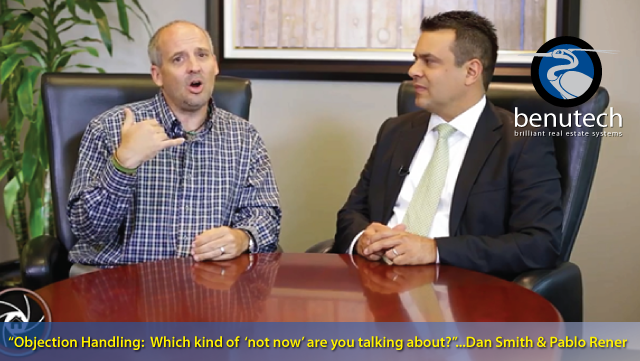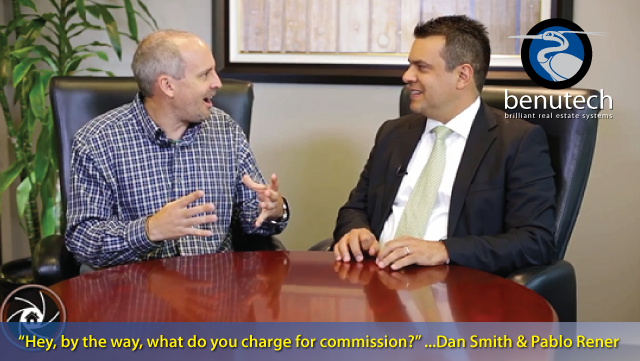The best way to get better at anything is to practice, and the next best way is to learn from experts. This is definitely true for sales, and while we can’t practice with you, over the next few weeks we will be featuring a series of videos in which Dan Smith, our expert real estate coach, role plays sales scenarios, which should not only give you ideas for your own practice, but should also be very educational and informative.
In order to prepare for those videos, this week’s video is an excellent overview on objection handling. Smooth objection handling can not only diffuse potential problems, but can also make the difference between a sale and a zero. Watch, practice, and keep learning!
But in order to set that up, what I wanted to do first is I wanted to go ahead and go over the seven steps, I’ve written down here, the seven steps to handling objections. And I believe these are the seven steps, things you need to remember to handling objections if you’re going to do it effectively. Ok?
Number one in handling objections, seven steps, step number 1. Listen to and hear their concerns. Don’t be so concerned about getting your point across. And a lot of times, they say something and we want to tell them why they’re wrong. We want to tell them the mistake they’ve made. And when we do that, we’re sort of telling them they’re wrong, and we’re not giving any credence to what they said. We didn’t really listen to their concerns, we didn’t acknowledge their concerns, we just went in and talked about what we wanted to talk about, and got our point across. And that is, that is a great way to not handle an objection successfully. So if you want to handle it successfully, listen to it and hear it and don’t be concerned about getting your point across. Truly listen to them.
Point number 2. The first way to handle an objection is to not handle it at all. Just let it go right on by. Keep going with what you want to say. Asking the questions you want to ask. Don’t really handle it. Best way to handle it is it just never gets brought up again. And believe me when I tell you, that happens on a real constant basis. So don’t handle it at all. See if it comes up again. That’s step number 2.
Step number 3. What I’ve written down is: Remember, you’re following the Jedi sales pattern, so don’t be so concerned with getting your point across. Now, some of you are going to have to push pause on this video, go back onto ReboReports, and check out my Jedi Sales Pattern video to really explain to you what that process is. But it is a powerful, powerful process. So, remember, you’re going to follow the Jedi sales pattern. You’re not concerned about saying what you want to say which is going to be real tough for some of you guys and gals, cuz you just really want to tell people sometimes. All right? A habit we want to break.
Number 4. The objection does come up again. They do bring it up again. Ok. Now, we have to handle it. But handle it by asking them what their solution would be. Don’t be so concerned about getting your point across and telling them that’s an invalid objection. Don’t be real concerned about that. Handle it by asking them, “You know, that’s a great point, a very valid concern. So, what is it that you would do, what is it that you would want to feel good about that?” Ask them for the solution. When they give you the solution, guess what you don’t have to figure out? The solution. And when they give you the solution, and now you agree to the solution, guess what they can’t do. They can’t say “well, that’s not the solution,” they can’t even go back on it. So asking them for their remedy, asking them for the ideas of how to handle it, that’s the best way to handle it. Step number 4.
Step number 5. We’ve asked them what their idea was. Let’s just pretend it’s commissions. They want to list at 4%. You want to list at 6%. Now that you’ve asked them, they’ve said, “Well, I don’t want to pay 6%, well, what do you charge?” and you’ve said “well, what I charge, we’ll talk about later, but let me ask, what do you want to pay?” And they say “Well, I’d like to pay 4,” That’s great, because now you have a starting point, the 4. You have an ending point, the 6. All you have to do is navigate the waters between the two to get there. Ok? But you can’t get there if you don’t have a place on this map that you’re starting from. So we asked for their solution, that’s their starting point. Now, again, in this point, point number 5, don’t be so concerned about getting your point across. Be more concerned about navigating these waters, charting the course in a series of questions in order to get to where you want to get. It’s really great if you can get them to say what you wanted to say. That’s a perfect scenario. And in the upcoming weeks, you’re going to hear a little bit, or a lot, actually, of me doing that with the other agent, so you can see how we kind of navigated those waters. Ok?
Step number 6. This is a big one, maybe the biggest step in there, actually. Master the art of tie down selling. Now, some of you have no idea what I just said, and that should be scary to you because you are sales professionals, and the number one sales skill you should probably be using and utilizing and having success with is using tie-downs in order to get the sale. So if you don’t know what tie-down selling is, you need to start, you know, there’s this magical little thing, there’s this website, they call it Google… All right? Go to Google. Type in “examples of tie downs” something like that. They’ll give you some examples of tie downs. I suggest you make a list. I suggest you start practicing them. Ok? You can go back on these ReboReports, I know that there’s a video that exists on me talking about tie downs. But you must master the art of tie down selling.
And then step number 7. Last step of handling objections. Be fearless, and adopt the mindset of “an objection is simply an opportunity to close.” You must be fearless. These sellers, these buyers, these potential clients, these prospective prospects. Right? They can smell fear on you like a blood can smell, like a shark can smell blood in the water. Right? They know it. If you are on your heels, if you are being mousy, they are going to eat you alive. It is like their primal instinct. They smell the fear and then they go after you. Some of you know what I’m talking about. It has happened to you. You must be fearless. You must be confident. You must be authoritative. Ok? Because if you are not, no matter how good the words you use are, the feeling that they’re still going to get is that you have some fear. And that is not going to work out so well for you when you come, when it comes time to actually, did you handle it correctly or not. You must be fearless. And if you cannot be fearless, if you are afraid, that’s ok. Fake it til you make it, even if you’re afraid, even if you are nervous, don’t let them know it. Fake it. Be fearless in front of them.
There you go, guys and gals. The seven steps for handing objections. Lots of roleplays coming up in the next couple of weeks for you to watch and learn from. If you have any questions and they come up, you can email me. On future videos I give my email address. I do want to encourage you to go to my website, there’s a lot of great free content there for you. There’s also my upcoming schedule of speaking, events, workshops, masterminds. Some of them are as little as $20 to attend. If you would like to come of those, I’d love to see you there, meet you. The website to go to is versatilityinsales.com On the right hand side you click the little button that says “upcoming events,” there will be a full calendar of what I’m doing and what I’m talking about, see if it’s something that’s interesting for you, ok? And let’s see. Think that about does it. Here’s something I want you thinking of as you go into next week, as you go on with this week. Ask yourself “what have I been doing today, what am I going to be doing this week?” and then ask yourself a second question, a follow-up question, or just remember this I guess you’d say, “To get what I’ve never had, I must do what I’ve never done.” So what do I need to start doing more of right now to get more of what I don’t have? Ask yourself that question. You have a fantastic week.


















